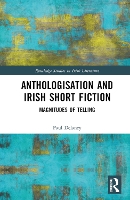


|
|
|
books
| book details |
Anthologisation and Irish Short Fiction: Magnitudes of Telling
By (author) Paul Delaney

|
This book is currently unavailable. Enquire to check if we can source a used copy
|
| book description |
This original new study explores the recent flowering of short fiction in Ireland. More specifically, it discusses the cultural, material, and ideological usages of the short form in the late twentieth and early twenty-first centuries, engaging with the forces that have helped to shape the production, dissemination, and reception of short stories over the last few decades in Ireland. The book is generically fluid and reads short fiction in its many guises, from short-shorts to long stories, and from standalone texts included in periodicals and online forums, to stories that were published in volumes, miscellanies, and edited collections. The book focuses especially upon anthologies and the act of anthologisation. The creation of an anthology is never a simple value-free act, since those associated with the curation of anthologies are always obliged to make decisions that are variously material, economic, formal, ideological, and aesthetic. Some of these decisions are founded upon personal preferences, others are grounded in subjective prejudices and biases; however, all have consequences for the ways that a literary culture is created, marketed, taught, and read. This new book explores this subject, and looks at the consequences for ways that we think about Irish short fiction in the contemporary moment.
| product details |
Normally shipped |
Publisher | Taylor & Francis Ltd
Published date | 28 Mar 2025
Language |
Format | Digital (delivered electronically)
Pages | 224
Dimensions | 0 x 0 x 0mm (L x W x H)
Weight | 0g
ISBN | 978-1-0403-2215-4
Readership Age |
BISAC | literary criticism / general
| other options |
|
|
|
To view the items in your trolley please sign in.
| sign in |
|
|
|
| specials |
|

|
Mason Coile
Paperback / softback
224 pages
was: R 520.95
now: R 468.95
|
A terrifying locked-room mystery set in a remote outpost on Mars.
|
An epic love story with the pulse of a thriller that asks: what would you risk for a second chance at first love?
|
|
|
|
|
|